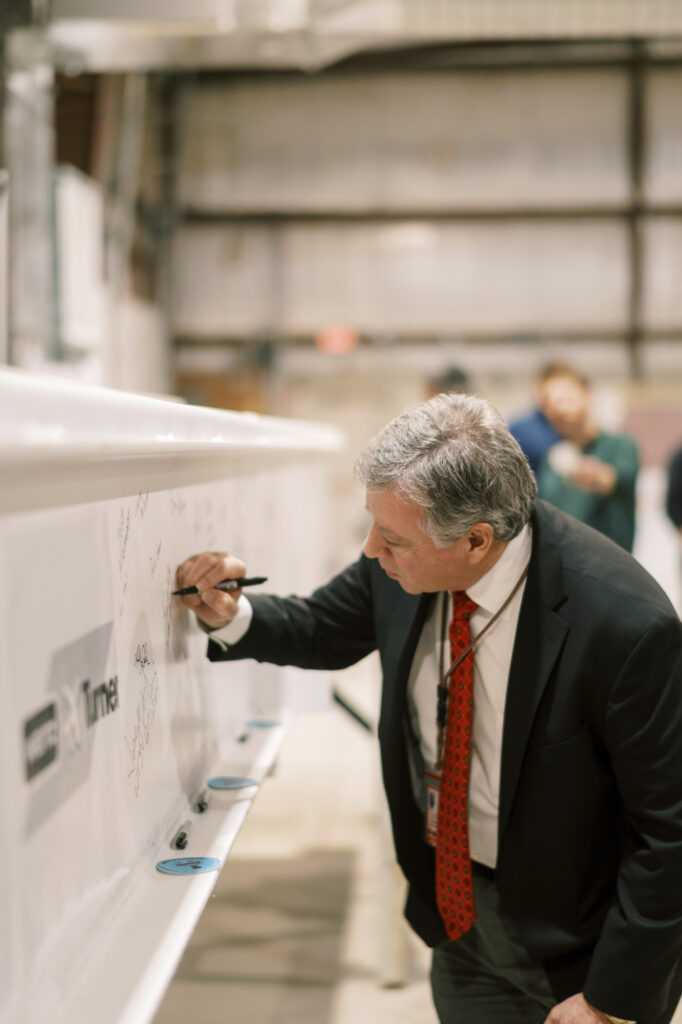Weathering the storm
Wells Fargo regional president takes on a scandal

KENT DARR Oct 31, 2017 | 4:55 pm
11 min read time
2,607 wordsAll Latest News, Banking and Finance, Business Record InsiderWith Marta Codina, you can’t avoid the observation that maybe she is one of those people who, like it or not, find themselves in the eye of the storm.
Wrought by human hands or Mother Nature, you name it, she has withstood a few.
In July, Codina was named community bank president for a Wells Fargo & Co. region made up of Greater Des Moines and western Iowa. The appointment came as the nation’s third-largest bank was fending off a reputational blow to the head created by what many believe was a sell-at-all-costs mentality nurtured by previous national leadership.
In Iowa, the problem seemed like a big-city issue. Codina, on the other hand, says “we own it,” meaning the Wells Fargo banking operations in cities large, small and in between. And in fact, a third-party review dating back to 2009 identified 26,518 potentially unauthorized accounts in Iowa, part of the 3.5 million accounts nationwide that have come under scrutiny.
Codina is a 16-year Wells Fargo veteran who was hired away from U.S. Bank because, as retired regional president and CEO H. Lynn Horak said, “Every once in a while, you think you just have to have this person. Those people don’t come along very often.”
Horak said he knew within the first 15 minutes of interviewing Codina, “I had to convince her to be part of the Wells Fargo team.”
He went on: “She has an engaging personality. … People naturally migrate to her. She is a natural leader. She has warmth, charm, positivity; you don’t find that in any one person.”
Those comments are echoed by people who have known her for a lifetime or over the years that she has lived in Greater Des Moines, working as a banker and acting as an advocate on issues of inclusion and diversity.
In her market, anyway, Codina appears to be the right person to right a megalithic operation whose wounds appear to be more to its pride and reputation than to its financial performance.
She tells her charges — with nearly 15,000 employees in Greater Des Moines, Wells Fargo is among the area’s largest employers and the metro has the third-largest concentration of Wells Fargo employees in the country, trailing Minneapolis and Charlotte, N.C. — that they have the opportunity these days to make history in efforts to restore trust among customers.
“Wells certainly has suffered reputational damage,” Horak said. “The quicker we recover from that and move on and regain the trust of a lot of people, the better. When you think about the bank in the totality of Wells Fargo, it’s not that big, but when you talk about reputations, it takes 100 years to build up and 10 minutes to tear it down.”
Codina started out in banking as a teenage bank teller in Houston, where she attended high school and graduated from the University of Houston. She moved to Iowa in 1992 to join U.S. Bank and worked there as a regional manager leading the retail banking division before Horak hired her at Wells Fargo.
Codina has a simple solution for repairing the damage to Wells Fargo’s reputation: Find out what bank customers want and need rather than what the bank wants them to have.
Seems a simple track, one that Codina said marks a return to an old-fashioned banking principle that the customer comes first, something she said the bank had veered away from. Her personal track, on the other hand, has been anything but simple. It is wrapped in history and tempest.
Making a history
Codina is a Cuban immigrant. She left the country with her parents, Raul and Marta, on June 14, 1962, three years after the end of the Cuban revolution and a few months after the failed U.S.-backed attempt to assassinate its leader, Fidel Castro. She was 9 months old.
Passage out of the country was secured when Raul Codina turned over the family home and his business, an automobile dealership, to the government. The family was allowed three changes of clothes. Guards at the Havana airport forced Raul to give up his Bic pen. Young Marta was allowed to keep her teddy bear, Osito, because the guard apparently didn’t have the heart to take it away. Her baby crib and all other personal possessions were left behind.
Codina said her father was a successful businessman and a lifelong learner. He obtained a doctorate from the University of Havana to please his mother. He studied socialism in the 1940s and 1950s — Codina was told a picture of Joseph Stalin was displayed in the family home — but decided that socialism “would not be good for us.”
As with many Cuban immigrants, first stop in this country was Miami’s Freedom Tower, considered the “Ellis Island of the South” for its role as the Cuban Assistance Center, where refugees sought relief after fleeing Castro’s Cuba.
Codina’s father learned of a unique program being offered at Emporia State College, far away from Miami in Kansas. The program, under the leadership of education professor Robert McAdoo, offered 12 Cuban men with higher education degrees — it was all men at the time, Codina points out — the opportunity to receive the equivalent of a doctorate degree.
The family lived in student housing, and it was there that she met a friend whom she calls “my cousin who isn’t really my cousin.” The woman, Gilza Fort Martinez, is that lifelong friend, and she has strong opinions about why Codina is the right person to guide Wells Fargo Bank out of its current storm. But more on that later.
Raul Codina, with his U.S. degree in hand, was placed to teach Spanish at Wayland Baptist College in West Texas. Though the college was the first in a Confederate state to enroll African-American students, the local community didn’t know what to make of the new arrivals from Cuba.
“There was a lot of racial tension,” Marta Codina said. “They couldn’t figure out what we were; we weren’t dark-skinned. We didn’t fall into the Mexican categories; Mom never spoke English.”
Her father lost the teaching contract after he suffered a stroke. He couldn’t carry books up stairs, and the college at that time was under no federal obligation to install elevators to accommodate people with disabilities.
“Because we were not citizens yet, there was no aid, so we were in the welfare category,” Codina said.
The family moved to Houston. At age 14 Codina became a U.S. citizen, along with her father.
“He could draw some Social Security. I grew up with no means, but my parents were amazing and very educated,” she said. Father and daughter attended Houston Astros baseball games. Raul Codina continued to study, keeping a journal of words that he would look up in a dictionary.
At 16, Marta Codina went to work as a bank teller. She hasn’t strayed from the banking business since that time. Her father died when she was 19.
“When I look at just what my dad did after he became a citizen, he was 60-something, he was so proud,” she said. “Then he wanted to teach citizenship classes for free, so he would teach other immigrants and refugees about U.S. history because he was so excited about it. I was in high school, and I would think, ‘Oh, God, this is all so boring.’
“But I think back on it, and he was just really proud to be here. My dad was a learner; if there is one thing I remember, he was a learner. He was always reading a book. If he came across a word, he would stop to look up the definition; he had a journal of words he had learned. I just thought he was insane, so boring. I was a teenager thinking he was crazy.”
These days, she imagines her son, Nicolas, 16, has the same reaction when she talks about Cuba and tries to get him to understand the Cuban culture in the Miami area.
“I didn’t get it when I was 16; I’m hoping that someday he does,” she said.
Codina would like to return to Cuba, but not now. She has searched Google for the family home in Havana, but cannot find it. She doesn’t know whether it still exists.
Codina considered, briefly, joining a Greater Des Moines Partnership-sponsored trip to the country several years ago. Her father had said the family would never return while Cuba was under communist rule.
She checked with Martinez, thinking that maybe the two of them could travel together. Martinez asked her father, who replied, “Hell, no.” That was the final word. No trip.
“So I really struggle now with going back,” Codina said.
Hurricane season
In early September, Codina sat in her office at the Financial Center, enjoying a tranquil view of downtown Des Moines, thinking about hurricanes.
Her old hometown of Houston was still flooded in the aftermath of Hurricane Harvey, and Hurricane Irma was bearing down on South Florida. Codina and her husband, Jim Bruno, a partner with Midwest Search Group, had just three months earlier bought a property in Naples, Fla., where they could be near the “crazy” of Miami, but not too close.
“It is a crazy place, wonderful but crazy,” she said. “That is exactly why we decided to get a property in Naples. It is close enough to Miami, it’s about an hour and 45 minutes to my cousin’s house (her friend, Martinez), but it is not in the crazy. I can go there, hang out, go to a concert, get my fill of Cuban culture, and then I can leave. I was raised in the Midwest, and I can’t do it.”
Codina said she and Bruno were evacuated from Key West, where they were to be married, as Hurricane Andrew approached in 1992. The wedding took place in Miami. Codina and Bruno also have a daughter, Maddie.
Codina’s friends in Houston escaped the worst of Harvey, and in Naples and Miami, the property and her best friend’s home received minor damage.
“Just like Wells Fargo, we’re going to be OK,” she had said while following the path of Hurricane Irma.
‘All I’ve ever known’
Just a week before Hurricane Irma arrived, Codina was attending a meeting of all Wells Fargo Bank managers when the results of an independent review of the creation of potentially false accounts dating to 2009 were released, bringing the number of fake bank and credit card accounts that had been created to 3.5 million.
A year earlier, Wells Fargo had revealed that a review of account activity between 2011 and mid-2015 found 2.1 million such accounts and said it would pay $185 million to federal and California regulators to settle claims. Former CEO John Stumpf was forced out and Wells Fargo made other organizational changes.
The bank has consolidated its local banking titles as well as its legal and ethics divisions.
For the last year, Codina been heavily involved with a Wells Fargo team that is developing a new approach to how customers are served in bank branches across the country.
The accounts scandal was attributed in large part to a Stumpf mantra that “eight is great,” meaning that each customer should have eight Wells Fargo products.
In her nearly 17 years with Wells Fargo, including serving as a branch manager and working at Wells Fargo Home Mortgage, Codina said she did not feel any pressure to sell products that were not in the best interest of her customers.
“I’ve seen lots of changes (during a 39-year career in banking). I remember when we didn’t sell; and then the financial industry shifted and “sell” wasn’t a four-letter word and things got a little skewed in the way we approached this,” she said. “We want to make sure our team members and our customers know that we apologize. … We just complicated things too much.”
Managers also were encouraged to “run it like you own it,” a message that might sound appealing to hard-driven employees hoping to rise in the corporation, but one that “led to some inconsistency,” Codina said.
Conversations with customers also could be scripted, with the focus on “what we said rather than how we said it,” she said. “My mantra has been to look at how the customer feels.”
The bank has opened call centers for customers in an effort “to get any harm resolved,” Codina said.
She also noted that in Iowa, at least, customers seem to still have a great deal of trust in the bank. She quickly points out the 178,000 hours of volunteer service bank employees put in across the state.
“Our people are established and have the trust of the community,” Codina said.
Statistics from the Federal Deposit Insurance Corp. appear to bear that out. Wells Fargo controls the market share for deposits in the state and in the Greater Des Moines market. The numbers have slipped slightly, but Wells Fargo still outpaces all competitors in the state.
“Surprisingly, we have not seen any significant runoff in customer base,” Codina said. “We’re not hearing a lot of concern; we had a customer in Sioux City thank us.”
Codina takes the issue seriously. She is not convinced that all of the accounts were created without the knowledge of customers. For example, a credit card could be issued for use during emergencies, and go unused. In such instances, it would turn up as a potentially unauthorized account, said Steven Carlson, a vice president for corporate communications who is based in Des Moines.
Codina tells her team that this is a time to make banking history.
“I tell them this is a time of opportunity for you, this is history,” she said. “The skills that we have to use now are transferable. You want my job five or 10 years from now, it might not look the same, but what they learn now they can take with them. … I figure that at 56 I have about 10 years left in the industry. I’m going to have some fun with it.”
An endorsement
Codina’s life isn’t all about banking, naturally. Ask what drives her every day, and the first answer is likely to be to make sure that other people have the same opportunities she has had.
She is a founding member of a Wells Fargo group called the Central Iowa Diversity and Inclusion Council. The immigration debate “is making me sick right now,” she said. Codina also serves on the National Advisory Council of the Robert D. and Billie Ray Center and is a vice chair on the executive committee of the United Way of Central Iowa. Her focus is on inclusion, diversity and early childhood development.
Her role at Wells Fargo and the range of her community involvement is of little surprise to longtime friend Martinez, a marriage and family therapist in Miami.
“The various organizations and committees that she either participates or leads also add to her extensive knowledge and willingness to help,” Martinez said. “In my mind, she epitomizes the title of community banking. She is approachable and willing to learn from her community as well as to teach her community.
“I believe that we learned these qualities from our immigrant parents. We were taught to work hard, set high expectations for ourselves and others in a very loving way, and most importantly be appreciative. Be grateful for the opportunities that we were given and then the opportunities that we created for ourselves. And once we had achieved some success, share with others. I believe these are the essential qualities that Marta brings to any organization.”






